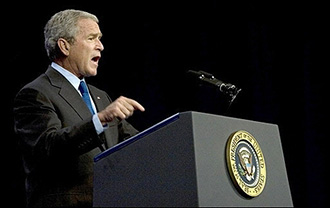 |
 |
 |
 News from Around the Americas | August 2007 News from Around the Americas | August 2007  
Bush Plays the Vietnam Card
 Olivier Knox - Agence France-Presse Olivier Knox - Agence France-Presse
go to original


| | US President George W. Bush addresses the Veterans of Foreign Wars National Convention in Kansas City, Missouri. Bush has warned that a hasty withdrawal from Iraq would trigger a bloodbath like the one in Southeast Asia after the US defeat and retreat from Vietnam. (AFP/Jim |
President George W. Bush on Wednesday warned that a hasty withdrawal from Iraq would trigger a bloodbath like the one in Southeast Asia after the US defeat and retreat from Vietnam.

"Three decades later, there is a legitimate debate about how we got into the Vietnam War and how we left," Bush said in an effort to turn on its head the analogy by critics who liken the Iraq war to the Vietnam quagmire.

"Whatever your position is on that debate, one unmistakable legacy of Vietnam is that the price of America's withdrawal was paid by millions of innocent citizens whose agonies would add to our vocabulary new terms, like 'boat people,' 'reeducation camps,' and 'killing fields,'" he added.

Bush, speaking to US veterans of 20th century conflicts in Asia, also likened nation-building and military operations in Iraq to democracy-fostering efforts in Japan and the decision to defend South Korea, respectively.

"Even the most optimistic among you probably would not have foreseen that the Japanese would transform themselves into one of America's strongest and most steadfast allies, or that the South Koreans would recover from enemy invasion to raise up one of the world's most powerful economies," he said.

The US president, pleading for patience with his unpopular war-fighting strategy, said those efforts held an important lesson and amounted to a valuable precedent.

"A free Iraq is not going to transform the Middle East overnight, but a free Iraq will be a massive defeat for Al-Qaeda. It will be an example that provides hope for millions throughout the Middle East. It'll be a friend of the United States. And it's going to be an important ally" against terrorism, he said.

Less than a month ahead of a key US report on progress in the Iraq war, Bush sought in his address to answer critics calling for a US withdrawal and also to reaffirm his support for embattled Iraqi Prime Minister Nuri al-Maliki.

"Prime Minister Maliki's a good guy, good man, with a difficult job, and I support him," said Bush, seeking to dispel any sense that Washington has been distancing itself from the beleaguered government in Baghdad.

"Many are frustrated by the pace of progress in Baghdad, and I can understand this," he said. "A free Iraq's not going to be perfect. A free Iraq will not make decisions as quickly as the country did under the dictatorship."

Leading Democratic Party presidential hopeful Hillary Clinton was one who urged the Iraqi parliament to get rid of Maliki.

She spoke after a top Democratic senator, Carl Levin, hinted after a two-day visit to Iraq that Maliki should go.

"I share Senator Levin's hope that the Iraqi parliament will replace Prime Minister Maliki with a less divisive and more unifying figure when it returns in a few weeks," Clinton said in a statement.

In his historical analysis Bush glossed over key differences, such as the fact that Japan, unlike Iraq, was not in the throes of sectarian violence that some have called civil war when Washington tried to plant democracy in the ruins of empire there.

"The important thing on this one is that the president was putting war into historical context," said a US official, asking to remain anonymous.

"And the important thing for us to remember here is that our relations with Japan, our relations with South Korea and our relations with Vietnam have never been better."

But Democrats quickly fired back, with Bush's 2004 rival for the White House, Senator John Kerry, saying it was "not surprising that he (Bush) would oversimplify the differences and overlook the tragic similarities."

"If the president wants to heed the lessons of Vietnam, he should change course and change course now," said Kerry.

Bush also drew broad parallels between the global war on terrorism and conflicts in Asia, likening Japan's 1941 strike on the US Pearl Harbor base to the September 11, 2001 terrorist attacks by Osama bin Laden's Al-Qaeda network.

Meanwhile in Iraq, the death toll continued to rise.

Fourteen US troops were killed when their helicopter crashed and a US soldier was killed in Baghdad, bringing the US military death toll since the 2003 invasion to 3,720.

The Iraqi security forces say they have lost at least 12,000 members, while Iraqi civilian death estimates range from 70,000 to 655,000.

In a television interview Iraqi Foreign Minister Hoshyar Zebari said that his country would fall apart and regional wars would break out if US-led coalition forces were suddenly to withdraw.

"The sudden withdrawal of American troops in Iraq would cause the collapse of Iraq and will lead to the disintegration of and division within Iraq," he told US-funded Alhurra Television in an interview.

"Sudden withdrawal would also mean regional interventions and conflicts." | 
 | |
 |



